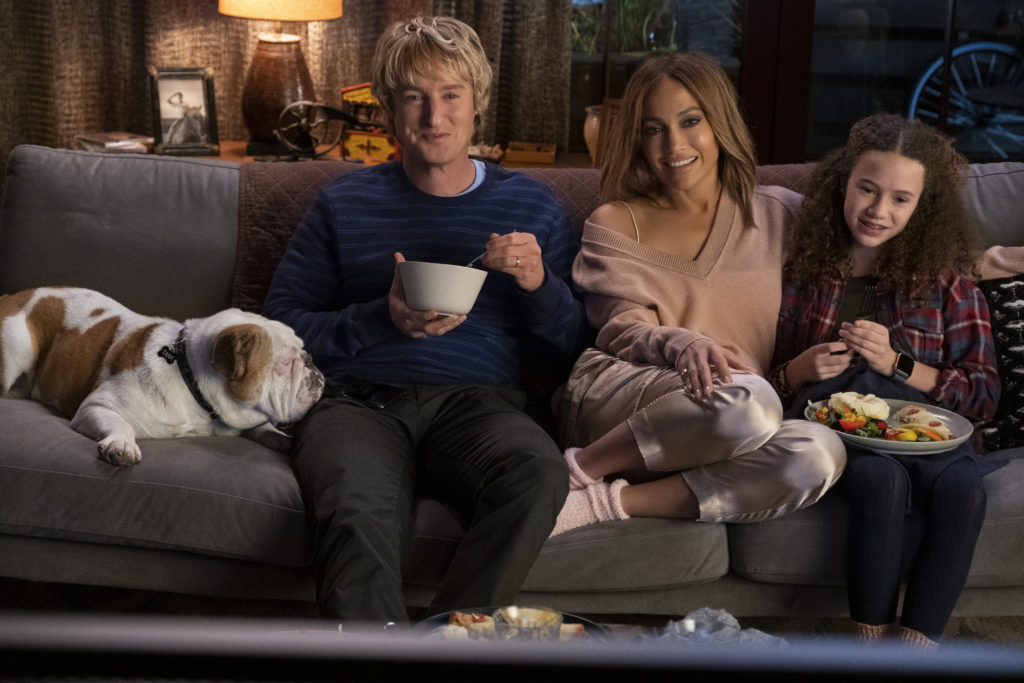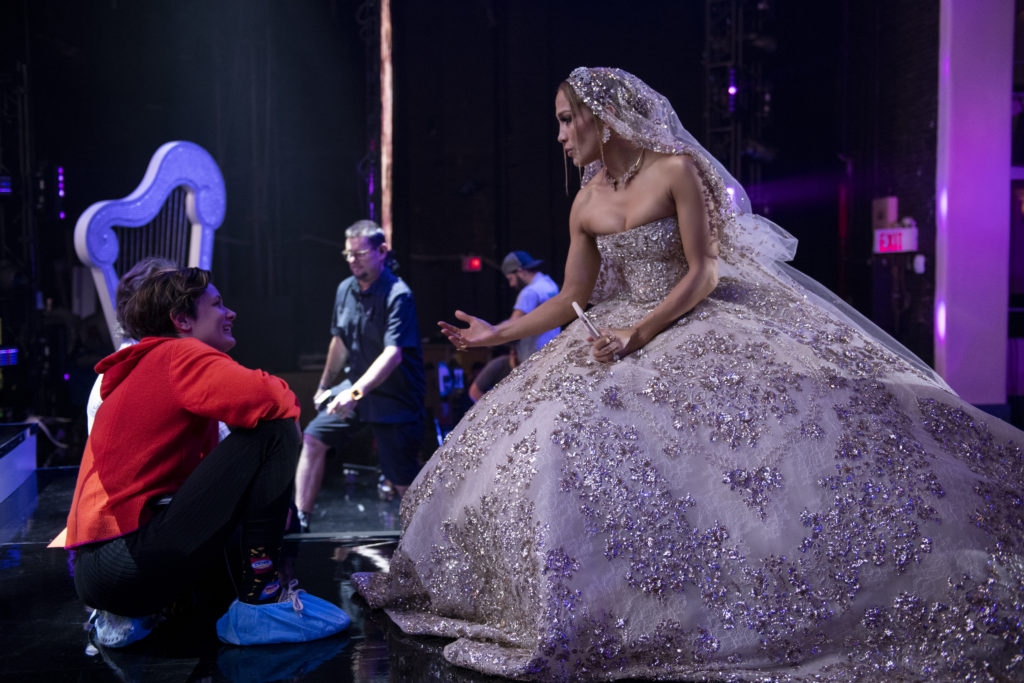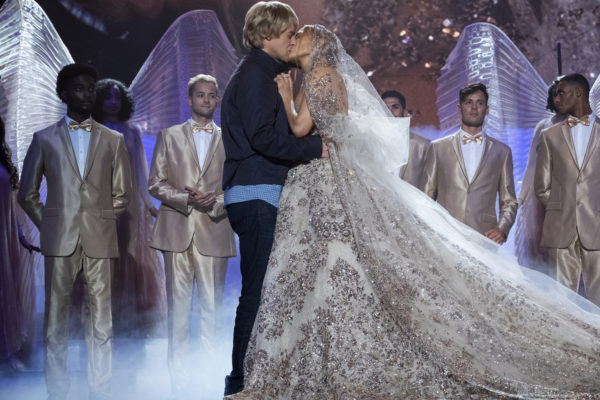In the grand tradition of off-the-wall cinematic meet-cutes comes Marry Me, in theaters this weekend with a day-and-date release from Universal. Jennifer Lopez (who also produced) stars as pop superstar Kat Valdez, whose plan to get married before a crowd of thousands at one of her concerts goes awry at the last minute when she finds she’s been cheated on by her hubs-to-be. Looking for love and willing to take a leap of faith to find it, she picks mild-mannered teacher Charlie (Owen Wilson) out of the crowd to marry instead, thrusting the pair into a rom-com whirlwind that makes them reassess the very different worlds they live in.
Helming the project is Kat Coiro (A Case of You), whose last few years have been spent busy on the small screen, directing for shows like “Girls5eva,” “It’s Always Sunny in Philadelphia,” and Marvel Studios’ upcoming “She-Hulk.” In advance of Marry Me‘s release, she spoke to Boxoffice Pro about her relationship with the silver screen and the “real escape” provided by a good rom-com.
This film had a long road to the big screen, even when you take out a worldwide pandemic. It started life as a webcomic, then became a graphic novel. How did the beginning of this project play out?
Elaine [Goldsmith-Thomas], who is Jennifer’s partner and producer, and Jennifer had optioned the graphic novel years ago, and they had tried to get it to the screen for a while. I went to meet Elaine, and we had a wonderful conversation about the male lead. Jennifer’s part was always crystal-clear, written for Jennifer. But the male lead was a little bit murky. We hired a writer that I’d worked with before, Harper Dill, and we crafted it so that it was a true two-hander, and they were both very fully realized characters who both had a lot of confidence, even though their lives and their experiences are so different. Once we did that path, to me, Owen was the only person who could play that role opposite Jennifer. And then, two years ago, we shot it! So we are so excited to finally have it see the light of day.
What was the stumbling block on the male lead? What did you need to change?
When you have a character like Kat Valdez-slash-JLo that is so big and larger-than-life and confident and on top of the world, you really need somebody who the audience is going to root for her ending up with. And if the guy is super impressed by her celebrity life and feels in any way mooch-y, I don’t think it works. And so we crafted this character, who, although his life is small and simple, he’s very proud of it. He loves teaching. He loves taking care of his daughter. He has a lot of pride in this very simple life. And part of what Jennifer’s character ends up benefiting from having him in her life is a connection to the simple that she’s lost track of. The original male character just didn’t have that confidence. He was like, “Oh, whoa, private jets!” And then you kind of don’t root for her to be with him.
You hope that this is a film that both men and women want to watch. And, I do think, having watched it with some audiences, the men love the film. And they love Owen, and they can relate to him. And that’s just the key to a good rom-com, that both of the characters are accessible.
Aspirational and also accessible can be a hard note to strike.
I feel that we got there. And it has so much to do with those two actors. They’re both incredibly confident people who, in a lot of ways, mirror the roles that they’re playing. They both brought a lot of themselves to these roles. So even though it is a big, glossy rom-com, and even though it’s got this far-fetched premise, there’s a lot of emotional authenticity there brought by those guys.

You mentioned that you were able to see the film in front of audiences?
Way back, right after we filmed. We were able to see it in front of a couple audiences before everything shut down. It wasn’t a finished product, but it had that quality where the audience was incredibly engaged, even vocally engaged, which is always exciting.
I know Marry Me is going day-and-date on Peacock, and it’s every individual’s choice on how they want to see it. But for me, personally, seeing a good rom-com with a crowd is such a great experience.
This is a film made for the theater. To me, it’s like a concert. And seeing it with an audience reaffirmed everything I hoped it would be. People sing along and they clap and they yell at the screen. It has a very interactive quality. I understand the desire to put it both theatrically and streaming, just the way the world is right now. But I actually think we’re going to be okay., because I think [this is] the kind of event that is going to draw people to the theaters. If people don’t feel comfortable, they have an option. We do want everyone to see it.
Speaking of events and spectacles: I loved the bit where JLo does a weird latex nun number at one of her concerts.
I have to get a lot of credit to Jennifer and Tabitha D’umo, her choreographer, and Rob Zangardi, her designer. That song was something that Jennifer and her musical partner, Benny Medina, had wanted to use. So that song itself gave birth to all those visuals, with that team. It’s definitely one of my favorite numbers.
It felt a little Popstarish. I’m sitting there like, “Is this supposed to be as funny as it is?”
Absolutely! One of the things that’s really important to me in the film, that is an underlying thread, is her journey as an artist. The first day I met Jennifer, and we were talking about the project, she had a little Bluetooth playing a song that we were talking about putting in the film. She was singing along, and the Bluetooth dropped out. And she kept singing. To hear Jennifer Lopez a foot away from you, singing a capella, no production value…. I said: “Oh my god, if I can give even a little bit of this to the world, I think they will freak out.” Because she’s so larger that life. Everything is so big, that you forget that at the heart there is this incredible artist. It was such a raw moment. We ended up crafting that moment when she sings “On My Way,” and she’s fooling around on the piano and it’s just her experimenting, translating the emotions into song. To get to that moment and feel like you’ve earned this artistic journey, we really wanted to start with the poppiest, most spectacle-heavy, outrageous show that we could, just show where she goes, Because, yes, it’s about a man and a woman who fall in love, but it’s also about an artist finding her voice. Reclaiming her emotional power.
What I love so much is that it’s not just about finding a guy, and that’s what fulfills you. It’s about simultaneously finding a guy who you really like, who actually helps you find the best in yourself and helps you reach new heights as an artist. And that doesn’t mean there’s anything wrong with being a pop star and going back to that flash. But it means being able to access the reason you became an artist, a singer, a storyteller. That’s something that’s very exciting to me, as a person, as an artist, as a woman.
What’ve you been to see in theaters recently, since things have opened back up and studios have started putting out more films?
West Side Story. It is a filmmaking masterpiece. It’s very interesting. It feels like Steven Spielberg’s homage to something that he loved and felt like he could bring new layers to. I guess I wasn’t expecting such a direct remake. It’s stunning, fantastic. There are shots in there that I’m still puzzling through.
Speaking of that nostalgia factor, is there a particular hometown theater you went to growing up?
I lived a lot of different places. One of the places I lived was in Key Largo, when I was in elementary school. I remember my family and I going to see Jurassic Park in the theater. There were only two seats, in the first row on the left side, and we were a family of four. We sat in those two seats, all four of us, and watched Jurassic Park. In high school, I went to boarding school in northern Michigan, and we got to take our little shuttle into town on the weekends. And we’d always go to the theater in the mall. I have many happy memories of that.
I was actually thinking about it the other day, because you read all this doom and gloom about streamers killing the theater. There are these memories that I think you can see in filmmaking. Especially the films of the 60s and 70–all the filmmakers had such a deep and visceral and poetic connection to the theaters. I was thinking, “Gosh, for storytelling, it would be so horrible to lose that.” But I think we’re just in a strange period. I think people need that: not only those personal memories, but that communal experience. That’s why I feel so good about Marry Me, because I do think it is a shared experience. I think people are going to crave that. It’s fun to watch anything from your living room, but we’re looking for community right now. Theater is one of those places, like concerts and sports events, that gives us that connection to a shared experience.

What was the first movie you remember seeing in a theater?
Mary Poppins. I don’t know why it was in a theater. I saw it in a specialty theater or something and became absolutely obsessed. It’s what made me go into filmmaking.
And I imagine the experience must have been part of that. It might not have hit so hard had you just popped in a VHS.
100%. I remember being so immersed. You can’t get up and go to the bathroom. You can’t fall asleep. You are in the film. I remember feeling that I was Mary Poppins, that I was Julie Andrews. I didn’t come from a show business family at all, in any way. I remember thinking, “Oh, what I want to be is a performer, an actress.” That’s how I started in my training in boarding school and in college. It wasn’t until I started working as an actress that I said, “Oh my gosh, there’s a whole other side of it!” And I very quickly transitioned into filmmaking.
There all these women behind the camera [in Marry Me], and I really hope that little girls can read the stories and see these things and know that you don’t just have to be an actress. There are all these other roles that you can do.
What are some of your favorite rom-coms? Or do you even really see Marry Me as a rom-com?
That’s an interesting question. It’s definitely going to be labeled that way. I think this might be a bit of a sexist thing, but I do think there’s a negative connotation to rom-coms. That it’s fluffy and it’s superficial and it doesn’t have substance. I think that’s a perception, not a truth. [Marry Me is] a comedy that is romantic. But I actually do think there is depth to it. It explores some pretty timely social issues. The idea of fame–everyone wants to be famous, but being famous comes with a whole host of problems, and those famous people are still human beings. I suppose it is a rom-com. I just hope rom-com isn’t something that gets disparaged as being “less than.” I love going back to Preston Sturges. I love the old rom-coms.
Every time people dismiss rom-coms I just want to smack them over the head with an Ernst Lubitsch box set.
Really good rom-coms come in these times when people are seeking escapism, and that was something we always talked about. This film is aspirational. It’s a bit of an escape from the real world, which can be a bit difficult these days, to say the least. You look at the time periods where the great rom-coms have been made, I think there’s always some kind of turmoil going on. What we were talking about, with theaters: it’s a real escape. That’s another reason I think it’s going to play really well theatrically, because we’ve been stuck in our homes for so long. There’s an escape to this that I think is very appealing.
I love the old rom-coms. I love Singin’ in the Rain. There’s a classical, timeless feeling to that film that harkens back to those musicals. One of the really important things to me [in Marry Me] is in so many music films you see a little snippet of the song, of the performance. I really wanted to hear as many full-length songs as possible, and see Jennifer perform those shows. In that sense, we’re a bit of a musical, too, but more of a modern musical.
What I’m really excited about with Marry Me is, we’re not reaching for the humor. The humor really arises as part of these situations that occur between fully developed characters, rather than really pushing for jokes.
It’s an objectively weird and funny situation the characters find themselves in, but if you just cast funny actors and make the characters well-rounded, then the comedy comes naturally.
That’s the reaction to the script, to the trailer: This is so out there. But when you start to ask people how they met, how they found the one, it’s crazy how outlandish those stories can be. Even if they’re not as ridiculous as getting cheated on while you’re on stage and pulling a stranger out of the audience, there are so many little moments that have to go towards two people meeting. That was something I kept thinking about when I was developing and putting the world together. When you think about any relationship, it’s a bit of a miracle. One thing we added to the end credits were these little stories of people meeting. When you put it in that context: What are the chances that these two people meet and fall in love and find happiness together? Everything seems outrageous. Everything seems impossible. This is just an exaggerated version.



Share this post